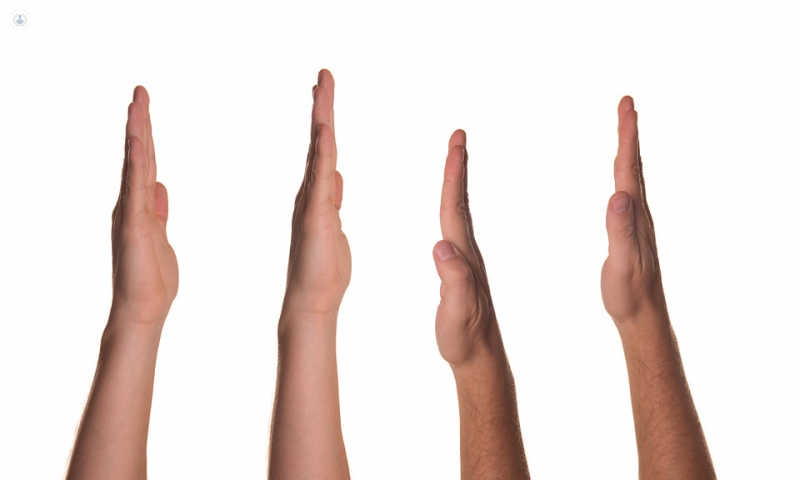Ulnar nerve entrapment
Ms Anna Moon - Orthopaedic surgery
Created on: 12-30-2015
Updated on: 12-14-2024
Edited by: Conor Lynch
What is ulnar nerve entrapment?
Ulnar nerve entrapment is a nerve condition where the ulnar nerve becomes compressed. The ulnar nerve travels from the neck to the hand and is responsible for the function of different muscles of the hand and sensitivity in the ring fingers and little finger.
When the ulnar nerve is trapped at the elbow, it is called cubital tunnel syndrome, which is one of two types of ulnar nerve entrapment. The other type is guyon's canal syndrome. Guyon's canal syndrome is when there is pressure on one's ulnar nerve in the wrist region.

What are the symptoms of ulnar nerve entrapment?
The main symptoms of ulnar nerve entrapment are:
- pain
- tingling in the fingers (little finger and ring finger)
- numbness
- a burning sensation
In cases of severe entrapment, you may feel a loss of sensation in some fingers and the medial edge of the forearm. The symptoms get worse when the elbow is flexed. Left untreated, you might feel weakness in your hand or even notice muscle wastage.
If you have tingling in your other fingers, this may be a sign of carpal tunnel syndrome.
What are the causes of ulnar nerve entrapment?
Ulnar nerve entrapment can be caused by:
- thoracic outlet syndrome
- arthritis in the elbow
- trauma to the elbow
- infections
- tumours
You are also more likely to experience ulnar nerve entrapment if you repeatedly place strain on the nerve by keeping the elbow bent. This may be due to the way you sleep or your posture at work.
Can ulnar nerve entrapment be prevented?
You can help to reduce the chances of trapping your ulnar nerve by:
- reviewing how your sleep and your posture at work
- wearing protective clothing during contact sports
- making sure you warm up before exercise and cool down afterwards
How is ulnar nerve entrapment diagnosed?
Ulnar nerve entrapment is first diagnosed with a medical examination. The doctor will ask about your symptoms and examine your arm, carrying out a number of tests to check which may nerve may be compressed and where.
Follow-up tests can include:
- an X-ray to get a detailed look at the bones in your arm which may be compressing the nerve
- nerve conduction studies to assess the function of the nerves in your arm and see where it may be compressed.
How is ulnar nerve entrapment treated?
The first line of treatment is non-surgical and can include a splint to keep your arm straight at night and anti-inflammatory medication.
If these measures fail to improve symptoms, surgical intervention may be required. Surgery can include:
- widening the cubital tunnel to give the ulnar nerve more space
- moving the ulnar nerve to avoid compression from the elbow
Surgery is generally effective, though you may need to wear a splint for a few weeks after the operation.
How common is ulnar nerve entrapment?
According to current research, carpal tunnel syndrome is the second-most common peripheral neuropathy that affects one's upper limbs. Guyon's canal syndrome, however, is quite rare.
What are the associated risk factors?
People who play baseball, tennis, and/or golf on a regular basis are at a particularly high risk of developing ulnar nerve entrapment. Other risk factors include:
- frequent construction work
- smoking
- using keyboard frequently
- weightlifting
What are the complications of ulnar nerve entrapment?
Severe ulnar nerve entrapment can, in some cases, lead to muscle loss in the hand. This loss, unfortunately, can be permanent for some.
What is the prognosis for people with ulnar nerve entrapments?
Thankfully, roughly half of patients who are diagnosed with an ulnar nerve entrapment manage to get some form of symptom relief non-surgically. Surgery is normally highly effective when required. Having said that though, one in every eight people suffering from cubital tunnel syndrome notice that symptoms return even after surgery, which is down to the fact that the surgery performed didn't fully eradicate or treat the underlying cause.
When should I call a doctor?
If you notice or experience any of the following, it is important to seek medical advice:
- difficulty holding or picking up items
- elbow pain
- wrist pain
- hand numbness
- hand tingling
- finger numbness
- finger tingling
- problems buttoning shirts
- problems or difficulty holding a pen







